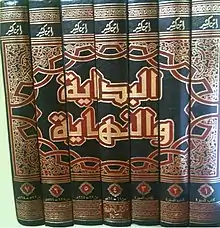al-Bidaya wa-l-Nihaya
al-Bidāya wa-l-Nihāya (Arabic: البداية والنهاية, The Beginning and the End), sometimes also known as the Tārīkh Ibn Kathīr (History of Ibn Kathir), is a work on Islamic history by the Sunni Muslim scholar Ibn Kathir (d. 1373).[1][2]
 Cover photo of al-Bidaya wa-l-Nihaya | |
| Author | Ibn Kathir |
|---|---|
| Country | Mamluk Sultanate |
| Language | Arabic |
| Genre | Islamic History |
Publication date | 14th century (original), |
| Pages | 10125 pages (14 volumes) |
| ISBN | 978-9953520841 |
Overview
The different volumes of the book deal with the beginning of creation and the sending of man upon the earth, the lives of the prophets, and the lives of the companions of Muhammad.[2] The last volume records predictions of future events such as the signs of the day of judgment (Qiyama), when Muslims believe people will enter Janna (heaven) or Jahannam (hell).[1]
See also
Arabic Wikisource has original text related to this article:
References
- Robinson, Chase F. (2003). Islamic Historiography. Cambridge University Press. p. 134. ISBN 978-0-521-62936-2. Retrieved 29 November 2022.
- Petry, Carl F. (26 May 2022). The Mamluk Sultanate. Cambridge University Press. p. 229. ISBN 978-1-108-47104-6. Retrieved 29 November 2022.
This article is issued from Wikipedia. The text is licensed under Creative Commons - Attribution - Sharealike. Additional terms may apply for the media files.